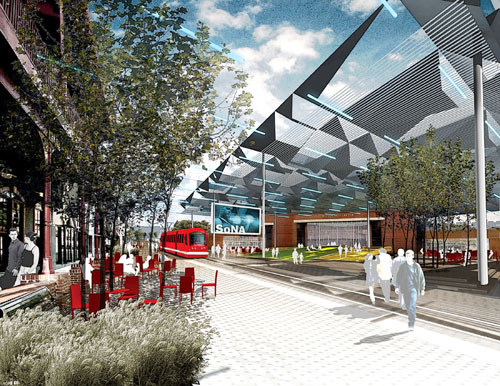Fayetteville Transit City Scenario Recognized in 2012 Charter Awards Program

In Fayetteville 2030: Transit City Scenario, the remote Walton Arts Center is integrated into the new shared street through a covered transit plaza. Shared streets are pedestrian-dominated streets that also accommodate motorized vehicles, where motorists are compelled to behave socially.
FAYETTEVILLE, Ark. – The University of Arkansas Community Design Center’s project Fayetteville 2030: Transit City Scenario has won an honorable mention in the 2012 Charter Awards. The awards program is sponsored by the Congress for the New Urbanism (CNU), the leading international organization promoting walkable, mixed-use neighborhood development, and sustainable communities.
The center is an outreach program of the Fay Jones School of Architecture at the University of Arkansas.
The Charter Awards “recognize excellence in architectural, landscape, and urban designs built in harmony with their physical and social contexts,” the CNU website states. “Awardees are selected for their excellence in fulfilling and advancing the principles of the Charter of the New Urbanism, which defines the essential qualities of walkable, sustainable places from the scale of the region down to the block and building.”
The 12th annual awards program attracted a competitive field from around the world, and 13 projects were recognized.
The Fayetteville 2030: Transit City Scenario project was sponsored in part by a 2011 planning grant from the National Endowment for the Arts, with matching in-kind resources provided by the City of Fayetteville. This scenario models a future based on development of a streetcar system on College Avenue connecting the downtown/University of Arkansas campus area with the Northwest Arkansas Mall. Recognizing that more than half of Fayetteville’s environment projected to exist by 2030 has not yet been built, the plan shows how 80 percent of future growth could be incented to create a model city for smart growth.
Jury chairman, Douglas Kelbaugh, said this of the Fayetteville 2030 project: “Speculating boldly in a community that has the economic wherewithal and appetite to realize bold projects, this corridor study promotes transit-oriented development and arterial-strip infill that imaginatively capture the ambitions of the fast-growing community.”
“Recognition from CNU is important to the Fayetteville Transit City effort, since urbanism is often the missing piece in discussions on sustainability and smart growth,” said Stephen Luoni, Community Design Center director. “Far more than any progress that may be gleaned from supply-side green technologies and alternative power sources, our land development patterns and transit solutions are by far the most effective solutions for tackling climate change and energy conservation. Only urbanism gives us a holistic framework through which community-scaled systems related to energy, water, waste and transit can be addressed. We are very pleased to have CNU’s support behind this discussion.”
Kelbaugh, also a CNU board member, is professor of architecture and urban planning and former dean at the Taubman College at the University of Michigan. He will honor the best of new urbanism at the Charter Awards ceremony on May 10. He will describe the lessons and trends learned from this year’s award winners and frame how new urbanism is reshaping and redeeming cities and towns.
The Fayetteville 2030 project will be featured at CNU 20, the organization’s annual convention, scheduled in May in West Palm Beach, Fla. Award winners and honorable mentions, along with full project descriptions, are listed on the CNU Charter Awards web page.
Luoni will also give a brief project presentation in a symposium on public transportation from 9-11 a.m. April 14 at the Fayetteville Public Library, 401 W. Mountain St. The symposium, featuring presentations and a panel discussion, is part of the library’s Green Your Life series of Earth Day events.
Contacts
Michelle Parks, director of communications
Fay Jones School of Architecture
479-575-4704,
mparks17@uark.edu
Headlines
Four Students Named Goldwater Scholars; Two Earn Udall Honorable Mentions
Four U of A students have received the prestigious Goldwater Scholarship, an award for top students in mathematics, science, and engineering.
Cross-Campus Collaboration Culminates in New Outdoor Geological Installation
Grand opening event to celebrate the new GeoLab installation at the U of A’s Gearhart Hall courtyard is set for May 3. The installation will be open to the public year-round.
First Students to Use Online Degree to Hone Nursing Leadership, Elevate Patient Care
Hanna Baxendale and Wendi Kimbrell will begin coursework in the Doctor of Nursing Practice-Executive Master of Business Administration program offered by the Eleanor Mann School of Nursing and Walton College.
Join the Office for Sustainability on a Final Cruise to Campus
Cruise to Campus Wednesdays have fostered a gathering space for individuals interested in biking to campus. Drop by the Old Main Lawn from 7:30-10 a.m. Wednesday for coffee, something to eat and conversation.
Fay Jones School Student Ambassador Program Gives Voice to Design Students
The student ambassador program at the Fay Jones School of Architecture and Design is built to connect top design students with their school, its alumni, its future students and others inside and outside the school.




